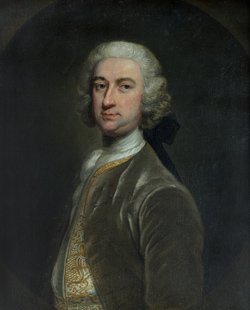Paxton’s neighbors teased him for his elaborate courtesy and his bachelor status. A big part of those criticisms, I suspect, was that Paxton didn’t fit New England’s model of masculinity.
That becomes quite clear in this anecdote, which appeared in the 18 Dec 1769 Boston Gazette:
Whereas a Sett of naughty Boys, not having the Fear of the reforming Justice, nor of his M[ajest]y’s Troops here stationed, before their Eyes, did in a very tumultuous and outrageous Manner assemble themselves together in Order to Tar and Feather a rascally Informer [George Gailer on 28 Oct 1769], to the great Terror of sundry of his M[ajest]y’s timorous Subjects usually distinguished by the opprobious Name of C[o]mm[issione]rs;I doubt Paxton really tried to disguise himself in women’s shoes and a “Ridinghood.” But his enemies were happy to portray him as an “antiquated Beau” who could be scared by a football game and needed the protection of “a brawny African.” Eighteenth-century British society didn’t think about gender and sexuality exactly as we do today, but that newspaper item looks a lot like gay-baiting.
and whereas the right valiant and right worshipful and right noble Charles Froth, Esq [the way Whig newspapers had referred to Paxton since 1761]; on seeing the woful Spectacle exhibited, was then seized with an unusual panic and trepidation to the great discomfort of his delicate Nerves, and to the evident Disorder of his weak Intellects, insomuch as to Occasion a precipitate Retreat thro’ Back and By-Ways to his Kinsman Ph—ps’s, and when there thro’ the Excess of bodily Fear, all pale and trembling, he betook himself to a close Chamber, which was fast shut and barricaded strong, and to the disordering of the grisly Locks and gallant Apparel of the said antiquated Beau, he was necessitated for further Security to conceal himself beneath a huge Feather Bed, where he sweat most profusely for several Hours, to his great Damage, as he saith, and was at last with great Difficulty perswaded to emerge from Durance to take some Refreshment:
And further to the Loss of his necessary Repose there continued at his Cousin’s till near Day-break, at which Time having collected some small Share of Resolution, he formed the bold Design of venturing to his own Home; to which Purpose he fitted himself with a Pair of Women’s Shoes borrowed of Mrs. C—— [perhaps Paxton’s sister Susannah Cunningham], and a Ridinghood supplied him by his humane Cousin, and thus accoutred sallied forth under the Auspices of the Night, and the friendly Attendance of a brawny African, and without further Damage reached his own House.
This is therefore to caution these unruly Boys, that at any Time hereafter when they propose a Game of Foot-Ball, or any other noisy Diversion, that they take timely Care to advertise the said Charles Froth, Esq; that they intend him no Injury.
Paxton’s personal manners probably wouldn’t have made the newspapers if he hadn’t thrown himself into his work as a Customs officer and become one of the Commissioners of His Majesty’s Customs. But the other men appointed to that board never got the sort of personal criticism that Paxton did.
Three of those Commissioners disembarked from Britain on 5 Nov 1767 (as reenacted this afternoon around Faneuil Hall). Paxton was the only one whom the Pope Night processions individually lampooned. And his effigies bore labels like “poor charles the bachelor.”

No comments:
Post a Comment